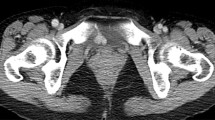Abstract
In advanced urothelial carcinoma (UC), approximately 20% of patients respond to pembrolizumab, an anti-programmed cell death-1 (PD-1) antibody. Herein, we reported a single case of UC showing coexistence of sarcomatoid subtype and glandular differentiation. Notably, only glandular differentiation was recurrent, probably progressive, and metastatic, which showed complete response to pembrolizumab. An 80-year-old woman presented with hematuria and dysuria, and an intra-vesical tumor was detected on ultrasound. Transurethral resections (TUR) were performed three times. In the first TUR, a sub-pedunculated tumor and a flat lesion were closely but independently located. Pathologically, the sub-pedunculated tumor was an invasive UC, sarcomatoid subtype. Meanwhile, the flat lesion was invasive UC with glandular differentiation. Despite the second and the additional TUR, the tumor was growing and a lymph node metastasis was detected. The third TUR specimen showed UC with glandular differentiation, and a positive PD-L1 expression as well as high density CD8-positive lymphocytic cells infiltration were observed. Pembrolizumab was administered for four courses after terminating the chemotherapy. The CT scan revealed shrinkage of both primary tumor and metastases. Cystectomy and lymph nodes dissection were performed, and no residual carcinoma was detected. The therapeutic effect was regarded as pathological complete response. Pembrolizumab could be effective for special subtype or divergent differentiation of UC, particularly in an event of an ‘immune hot’ tumor.




Similar content being viewed by others
Abbreviations
- BCG:
-
Bacillus calmette-guerin
- CR:
-
Complete response
- CT:
-
Computed tomography
- DCR:
-
Disease control rate
- GIST:
-
Gastrointestinal stromal tumor
- ICIs:
-
Immune checkpoint inhibitors
- ORR:
-
Objective response rate
- OS:
-
Overall survival
- PD-L1:
-
Programmed death-ligand 1
- PD-1:
-
Programmed cell death-1
- TUR:
-
Transurethral resection
- UC:
-
Urothelial carcinoma
References
Fradet Y, Bellmunt J, Vaughn DJ et al (2019) Randomized phase III KEYNOTE-045 trial of pembrolizumab versus paclitaxel, docetaxel, or vinflunine in recurrent advanced urothelial cancer: results of >2 years of follow-up. Ann Oncol 30(6):970–976
Powles T, Duran I, van der Heijden MS et al (2018) Atezolizumab versus chemotherapy in patients with platinum-treated locally advanced or metastatic urothelial carcinoma (IMvigor211): a multicentre, open-label, phase 3 randomised controlled trial. Lancet 391(10122):748–757
Bellmunt J, de Wit R, Vaughn DJ et al (2017) Pembrolizumab as second-line therapy for advanced urothelial carcinoma. N Engl J Med 376(11):1015–1026
Rosenberg JE, Hoffman-Censits J, Powles T et al (2016) Atezolizumab in patients with locally advanced and metastatic urothelial carcinoma who have progressed following treatment with platinum-based chemotherapy: a single-arm, multicentre, phase 2 trial. Lancet 387(10031):1909–1920
Zajac M, Boothman AM, Ben Y et al (2019) Analytical validation and clinical utility of an immunohistochemical programmed death ligand-1 diagnostic assay and combined tumor and immune cell scoring algorithm for durvalumab in urothelial carcinoma. Arch Pathol Lab Med 143(6):722–731
Amin MB (2009) Histological variants of urothelial carcinoma: diagnostic, therapeutic and prognostic implications. Mod Pathol 22(Suppl 2):S96–S118
Sanfrancesco J, McKenney JK, Leivo MZ et al (2016) Sarcomatoid urothelial carcinoma of the bladder: analysis of 28 cases with emphasis on clinicopathologic features and markers of epithelial-to-mesenchymal transition. Arch Pathol Lab Med 140(6):543–551
Cheng L, Zhang S, Alexander R et al (2011) Sarcomatoid carcinoma of the urinary bladder: the final common pathway of urothelial carcinoma dedifferentiation. Am J Surg Pathol 35(5):e34-46
Kamoun A, de Reynies A, Allory Y et al (2020) A consensus molecular classification of muscle-invasive bladder cancer. Eur Urol 77(4):420–433
Kobayashi M, Narita S, Matsui Y et al (2021) Impact of histological variants on outcomes in patients with urothelial carcinoma treated with pembrolizumab: a propensity score matching analysis. BJU Int. https://doi.org/10.1111/bju.15510
Reis H, Serrette R, Posada J et al (2019) PD-L1 expression in urothelial carcinoma with predominant or pure variant histology: concordance among 3 commonly used and commercially available antibodies. Am J Surg Pathol 43(7):920–927
Galon J, Bruni D (2019) Approaches to treat immune hot, altered and cold tumours with combination immunotherapies. Nat Rev Drug Discov 18(3):197–218
Acknowledgements
We are grateful to Yusuke Hosonuma, Koichi Kamada, and Nobuyuki Suzuki for providing technical support. We would like to thank Editage (www.editage.com) for English language editing.
Funding
This work was supported by Internal Grant (No. 21-B-1–03), Saitama Medical University.
Author information
Authors and Affiliations
Contributions
YM designed the study. YM and MY evaluated the histological and immunohistochemical findings. KK provided clinical data. KU and MH performed genetic analysis, YM wrote the manuscript, which was approved by all authors.
Corresponding author
Ethics declarations
Conflict of interest
All authors have no conflict of interests to declare.
Ethical approval
The case report has adhered to the relevant ethical guidelines. In addition, informed consent to participate was obtained from this patient. Our institution does not require reviews for case report.
Additional information
Publisher's Note
Springer Nature remains neutral with regard to jurisdictional claims in published maps and institutional affiliations.
Supplementary Information
Below is the link to the electronic supplementary material.

About this article
Cite this article
Miyama, Y., Kanao, K., Uranishi, K. et al. Complete response to pembrolizumab in a patient with recurrent and metastatic urothelial bladder carcinoma reflecting coexisting sarcomatoid subtype and glandular differentiation: a case report. Int Canc Conf J 12, 24–30 (2023). https://doi.org/10.1007/s13691-022-00568-5
Received:
Accepted:
Published:
Issue Date:
DOI: https://doi.org/10.1007/s13691-022-00568-5




